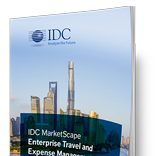Expense automation technology has most definitely gone mainstream and crossed Geoffrey Moore’s famous chasm. In fact, recent research in PayStream Advisors’ 2018 Travel and Expense Management Insight report shows that 65% of organisations have adopted automated expense processing solutions – significantly into the category of “late majority” in the bell curve of technology adoption. Among this group, 65% use a dedicated cloud-based expense management software tool.
For mid-market and enterprise companies, this number is even greater. Sixty-seven percent of mid-market companies with expense automation have upgraded to dedicated cloud-based systems, and a full 87% of enterprise-size organisations automate their expense submission process, with 61% of this group using dedicated expense management software.
What this data does reveal, however, is that a significant number of organizations still enforce manual, spreadsheet-based, expense submission – 37% of mid-market firms and even 13% of large enterprises.
If your organisation is still stuck using the arts and crafts style of expense report submission, it’s certainly time to investigate how automation can benefit your both your business travellers and also your finance team, who are burdened with task of reviewing, verifying and processing hundreds or even thousands of reports each month.
Related: 7 Reasons Why the Finance Team Should Push for Expense Management
But first, why do companies choose to stay on their existing solution? The number one reason – cited by almost a quarter of respondents – is that “current processes work” with the number two being a belief that the solution won’t deliver ROI. However, both of these barriers to sale are far outweighed by the number of respondents who cited the benefits that expense automation can provide.
Four out of the top five benefits cited by respondents can be specifically linked to improved ROI: 66% noticed improved spend visibility [ROI achieved by identifying and preventing wasteful spend]; 59% cited improved ability to enforce travel policies [ROI achieved by reducing expensive out-of-policy spend]; 53% identified reduced processing costs [ROI achieved by reducing finance team time spent on laborious manual processes]; and 47% reported a decrease in time spent processing and creating expense reports [ROI achieved by empowering travellers and administrators to spend time on more higher-value tasks].
As for not moving to an automated solution because current processes work – well, the same could be said for the invention of cars to replace the horse and carriage, or calculators over slide rules, or the introduction of services like Uber and Lyft to replace the taxi. In fact, 71% of all respondents listed improved reimbursement of employee expenses as a key benefit, and 37% observed improved employee satisfaction. Just because what you have works, doesn’t mean that it can’t (and shouldn’t) be improved by new solutions brought about by innovation.
Related: IDC MarketScape - Global Travel and Expense Management Vendor Assessment
Search
Subscribe
Latest Posts
- 9 Signs it’s Time to Switch Expense Management Systems
- Gartner and Ardent Partners Advise How to Build a Best-in-class Accounts Payable Operation
- When Cash (Control) is King: Is Your Accounts Payable Strategy Optimised for a COVID-19 World?
- Getting the Most Out of Your Spend Data with Emburse Insight Advisor
- How We Did It: Supporting Front Line Healthcare Workers During the COVID-19 Outbreak
Posts by Category
Our choice of Chrome River EXPENSE was made in part due to the very user-friendly interface, easy configurability, and the clear commitment to impactful customer service – all aspects in which Chrome River was the clear winner. While Chrome River is not as large as some of the other vendors we considered, we found that to be a benefit and our due diligence showed that it could support us as well as any large players in the space, along with a personalized level of customer care.
We are excited to be able to enforce much more stringent compliance to our expense guidelines and significantly enhance our expense reporting and analytics. By automating these processes, we will be able to free up AP time formerly spent on manual administrative tasks, and enhance the role by being much more strategic.
